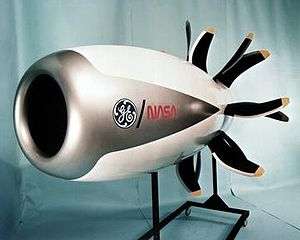General Electric GE36
| GE36 | |
|---|---|
 | |
| A model of NASA/GE Unducted Fan | |
| Type | Unducted fan |
| National origin | United States |
| Manufacturer | General Electric Aircraft Engines |
| First run | 1986 |
| Major applications | Boeing 7J7 (proposed) |
| Developed from | General Electric F404 |
The General Electric GE36 was an experimental aircraft engine, a hybrid between a turbofan and a turboprop, known as an Unducted Fan (UDF) or propfan. The GE36 was developed by General Electric Aircraft Engines.[1][2]
A General Electric F404 military turbofan was used as the basis for the GE36. The F404 mixed exhaust stream discharged through a turbine which drove two counter rotating stages of 10 and 8 fan blades each (originally 8 and 8).[3] The scimitar shape of the fan rotor blades can operate at speeds up to Mach .75, about 575 mph at sea level. The power turbine was a seven-stage (initially 6-stage[4]) turbine plus inlet and outlet guide vanes. The fourteen turbine blade rows rotated alternate rows in opposite directions. Each stage was a pair of rotors (there were no stators). The counter-rotating turbine ran at half the rpm of a conventional turbine[4] so did not require a reduction gearbox to drive the fan.[5]
Although the engine demonstrated an extremely low specific fuel consumption, cabin noise levels were a problem, even though the engines were mounted at the rear of the test aircraft. However, the noise was not considered an insurmountable problem. The downfall of this engine at the time was economic conditions (mostly a major drop in oil prices) post OPEC oil embargo; and at least the perceived public perception of the external fan blades being too much like “old and slow” prop planes. Even though these engines never made it past development and prototype testing, the carbon composite fan blade technology lives on and is currently being used in engines (General Electric GE90 & General Electric GEnx) that power the Boeing 747, Boeing 777, and Boeing 787 Dreamliner.[2][6]
See also
- Comparable engines
- Related lists
References
- ↑ "Ultra High Bypass Jet Engine Green Technology Airline Flight Test".
- 1 2 "GE Reports – Honey I shrunk the World: How Materials Scientists Made the Globe Smaller".
- ↑ http://www.flightglobal.com/pdfarchive/view/1987/1987%20-%201622.html
- 1 2 http://ntrs.nasa.gov/archive/nasa/casi.ntrs.nasa.gov/19900000732.pdf
- ↑ "Air & Space Magazine – The Short Happy Life of the Prop Fan".
- ↑ "GE Aviation - Aircraft Engine History and Technology".
- Flight International (2007-07-12). "Whatever happened to propfans?". Retrieved 2007-07-14.
- Dr Mark Taylor (Royal Aeronautical Society). "Open Rotor Engine Design and Validation" (PDF). Retrieved 2015-03-18.
- Philip Butterworth-Hayes (American institute of Aeronautics and Astronautics). "Open rotor research revs up" (PDF). Retrieved 2015-03-18.
- Professional Pilot Magazine - Douglas Wilson. "TURBOPROP HISTORY - TPs continue their key role in bizav". Retrieved 2015-03-18.
External links
- “New-Generation GE Open Rotor and Regional Jet Engine Demo Efforts Planned”, Aviation Week - May 12, 2008 - By Guy Norris
- "Green sky thinking - carbon credits and the propfan comeback?", Flight International, June 12, 2007.
- "Boeing UDF test footage", 1985
- "The MD-UDF Demo aircraft arrives at Farnborough", 4 September 1988
- "DREAM - Validation of radical engine architecture systems", Spanish Centre for the Development of Industrial Technology - Dave Bone (Rolls-Royce plc)
- Snecma / General Electric : GE36 UDF